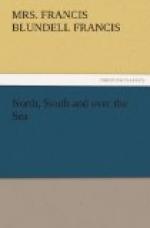“I’ll not want for aught,” returned Bob gruffly. “I don’t want no doin’ for, I’m out o’ th’ road up here, an’ ye’re fain enough, all on ye’! Thou can be off arter th’ Club thysel’ if thou’s a mind to.”
With many protests Mrs. Wainwright withdrew, and her husband, left to himself, proceeded to relieve his feelings by tossing his pillows over the back of the chair, and extricating his suffering limb from the blankets.
“I’m welly smoored,” he remarked indignantly, half aloud, “welly smoored I am. They reckon I’m a babby to be croodled and cossetted this gate. I’ll be that nesh afore they’n done, I’ll be fit for nought when I get about again.”
Leaning forward, and supporting himself on one leg, he threw open the window. The air, fresh and invigorating if keen as a knife, circled round the room, lifting his thick white hair, and making the prints on the wall flap and rustle.
“That wakkens me up a bit,” cried Bob; “does me good, that does. Our missus may barge as hoo likes, I’ll keep it oppen.”
He could hear voices and hurrying feet in the road below; people were beginning to assemble at the church; by-and-by the whole procession, headed by the band, would go marching down the street and in at the park gates to be refreshed and complimented at Thornleigh Hall; then it would take its way across the fields to Upton, turning the big banner so that the arms of the Squire of that place would be most en evidence when they halted for similar entertainment before the door of his mansion. Thence, through Upton village along the lane to the Thornleigh Arms; then the dinner—mirth and jollity lasting till evening. Old Bob, with knotted hands clasping the wooden arms of his high-backed chair, saw it all in fancy, his memory conjuring up each detail of the well-known scenes. He could see the grassy fields and the hedges white with bloom; he could smell the fragrance of the trampled earth; he could feel the sunshine and the brisk air; and then the warmth, the brightness, the good cheer at the Thornleigh Arms—his mouth watered at the thought of them. Would any one miss the oldest member, and drink his health? Well, this time at least, old Martin would not be there to dispute the honour.... Now he could hear the gate of his little garden swing open and then bang; the lads were starting. Bob, leaning on his elbow, craned his neck forward to see them. A certain expression of gratified parental pride stole over his face as he took note of the brave appearance presented by young Bob, who with his be-ribboned hat placed a little aslant on his curly locks, his Sunday suit brushed till not a speck of dust rested on its glossy surface, and his white staff held jauntily in his sunburnt hand, was indeed the picture of a comely young holiday-maker. When the father glanced at “our Tom,” however, his face darkened. There was Tom with his ill-fastened shoelaces trailing, his smart bandsman’s coat buttoned awry over a pair of trousers which were neither his Sunday best, nor the white-piped blue ones which formed part of his uniform as musician—these were a shabby, shiny, pair of worn broad-cloth usually kept for wet Sundays and Saturday expeditions to town; a suit, in fact, which had long been considered by no means presentable.




